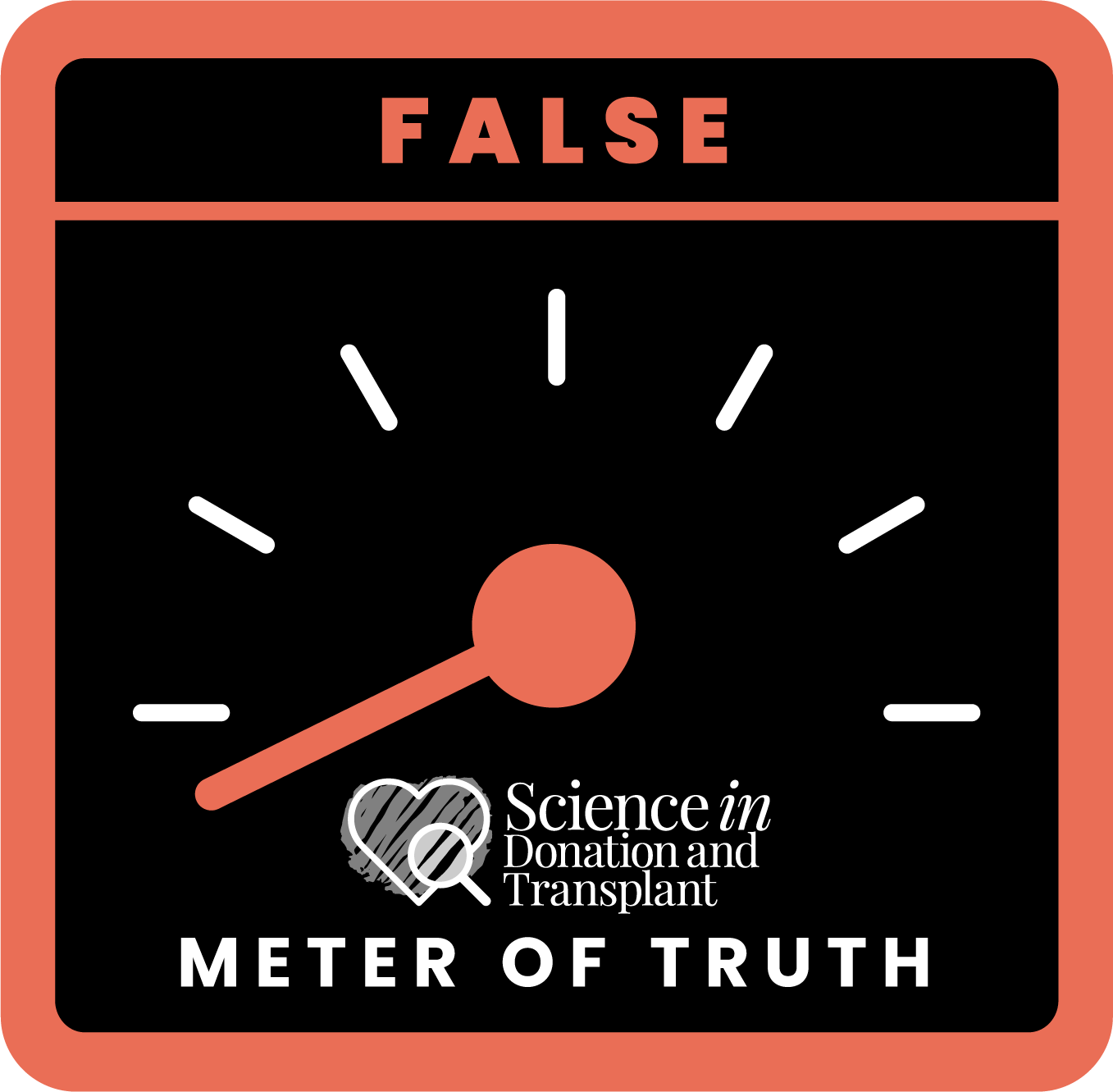Home / News / Fact Check / No, the Nonprofits Are Not Responsible for Their Deaths
Greg Segal stated on December 2, 2020, in an op-ed article
“In the last year, I’ve lost three people I love to the organ donation shortage. [...] And, frankly, I am exhausted of the government contractors responsible for their deaths fighting with their constituents rather than for them.”
In a recent op-ed in the Albuquerque Journal, Greg Segal, founder of Organize.org, writes of three people’s personal loss this past year waiting for transplants. Segal claims Organ Procurement Organizations (OPO’s), nonprofits whose sole reason for existing is to facilitate life-giving transplants, are “responsible for their deaths…”. Segal offers no evidence, only hyperbolic conjecture, which does not back up this horrific claim.
No one disputes the pain families go through waiting for a donated organ to save a loved one’s life. No one disputes the desire of families to speed up what can be a painful and frustrating process. Activism to help make the donation and transplant process better is welcome.
But none of this explains the vitriolic rhetoric from Organize.org and primarily from its founder Greg Segal.
Again, we understand Mr. Segal’s pain and frustration. The donation community worked hard to get his father and all other fortunate recipients life-saving transplants. Contrary to Mr. Segals’s allegation that the opponents to the new federal regulations are “moneyed interests,” the donation community is comprised of non-profit organizations, volunteers, and transplant physicians. In contrast, let's look at Mr. Segal’s newfound interest in the donation system. Organize.org is only the front-man in Segal’s efforts to take control of the nation’s life-saving organ procurement and transplant system.
Organize.org is a non-profit corporation controlled by Segal, whose original goal was to build a donor information network and sell it to the federal government and procurement organizations. His early efforts faced resistance. A national online registry was already being created through donation-related organizations and volunteers, and Mr. Segal badly wanted in.
Organize created private listings of potential organ donors, mainly by encouraging young people to express their general donation approval and posting their Facebook wishes. Organize then promised to sell its ability to scrape Facebook data to share it (for a fee) with organ procurement organizations. Their efforts fell short of registering organ donors. The actual donor registry information, comprised of legally enforceable ‘documents of gifts,’ was already available to OPOs from secure state registries for free.
Failing to monetize the donation decision through lucrative “government contracts” (Inc Magazine, June 2014), Organize obtained philanthropic dollars from hedge-fund-founded charities. Arnold Ventures, founded by former Enron Exec John Arnold, has been a consistent funder of Organize.
Segal writes that no OPO has been decertified. Low-performing OPO’s need assistance, not destruction. We don’t close low-performing hospitals. We help them do better.
Segal wants to add ”forced competition” between OPO’s, bringing chaos to the complex system that makes organ donation and transplants possible—spoken like a genuine venture capitalist with no professional experience in organ donation and transplantation.
Segal claims the historic rise in organ donations “is almost wholly attributable to the drug epidemic.” At the same time, Segal cites no source for this claim. We suspect this claim comes from an article by the same person who utilizes inaccurate death certificate data to support claims that tens of thousands of organs go unrecovered, Dr. David Goldberg.
According to the letter in The New England Journal of Medicine on February 7, 2019, Organ Donation and Drug Intoxication–Related Deaths in the United States, “The increase in the percentage of donor organs recovered from persons who died from drug intoxication ... is greater than would be expected from the increase in the rate of drug intoxication-related deaths alone.” This statistical fact, coupled with the common practice of reporting deaths of drug-users, and even former drug users as “opioid deaths” refutes Segal’s claim.”
As an April 10, 2020 letter in Clinical Transplantation states: “The authors [Goldberg et al.] anchored their analysis on a logical fallacy—that “drug‐related” deaths are deaths in which the decedent had any history of drug abuse. This rationale is akin to designating car crashes involving drivers who ever drank alcohol as “DUI‐related” accidents.” Darren Stewart Anne Zehner David Klassen John Rosendale, First published: 10 April 2020 https://doi.org/10.1111/ctr.13858
The increase in opioid deaths hardly supports Segal’s exaggerated claim that record donations and transplants are “ wholly” due to drug addicts dying. He discounts all systems improvements made by nonprofit Organ Procurement Organizations. Segal claims an unnamed data scientist as the source of the claim. If this claim is valid, it is incumbent on Segal to name the person.
As with most things, Segal uses hyperbole, contrived data, and lousy sourcing to make unfounded attacks on the organ donation system in our nation.


